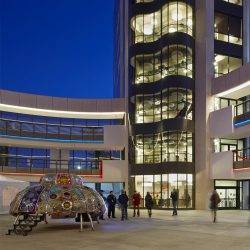February 22, 2019
When assessing workplace strategy: we should always test rather than guess
 Would an investor plow millions of dollars into a stock and never bother to track how the investment does? Of course not. Nor would they confuse the expected return on investment (ROI) with the actual results. We don’t guess about financial investments. We don’t base investment decisions on what some stranger does or how they say they’ve done. So why then, do many of the largest companies in the world invest millions of dollars in buildings or renovating their workplaces and never even bother to measure results. Why are they so willing to copy the unproven workplace strategy of others? Why are they satisfied with projected results, rather than measuring how their investments actually perform? (more…)
Would an investor plow millions of dollars into a stock and never bother to track how the investment does? Of course not. Nor would they confuse the expected return on investment (ROI) with the actual results. We don’t guess about financial investments. We don’t base investment decisions on what some stranger does or how they say they’ve done. So why then, do many of the largest companies in the world invest millions of dollars in buildings or renovating their workplaces and never even bother to measure results. Why are they so willing to copy the unproven workplace strategy of others? Why are they satisfied with projected results, rather than measuring how their investments actually perform? (more…)







 Although the majority (85 percent) of all business decision-makers agree that workplace health is a top priority, employees still aren’t being as open as they should, often playing down their illness or injury (32 percent) or feeling too busy to miss office hours (27 percent), a new survey by Bupa and Babylon Health has claimed. Worry over missing work is a key driver in avoiding appointments as seven in 10 employees (70%) have delayed or put off seeking medical advice when they should, despite the majority of business leaders having no issue with colleagues taking time off to deal with health issues. Men, young workers (18-34), Londoners and those employed in SMEs are all more likely than average to delay or put off seeking help. The data also shows that those in manual roles (vs. clerical) are more likely to shrug off illness or injury. Mark Allan, Commercial Director, Bupa UK, said: “As much as those in decision-making positions really want their employees to put their health first, they’re competing against a strong resistance from those who will strive to soldier on. This is particularly the case with those employees in SME businesses, amongst others.”
Although the majority (85 percent) of all business decision-makers agree that workplace health is a top priority, employees still aren’t being as open as they should, often playing down their illness or injury (32 percent) or feeling too busy to miss office hours (27 percent), a new survey by Bupa and Babylon Health has claimed. Worry over missing work is a key driver in avoiding appointments as seven in 10 employees (70%) have delayed or put off seeking medical advice when they should, despite the majority of business leaders having no issue with colleagues taking time off to deal with health issues. Men, young workers (18-34), Londoners and those employed in SMEs are all more likely than average to delay or put off seeking help. The data also shows that those in manual roles (vs. clerical) are more likely to shrug off illness or injury. Mark Allan, Commercial Director, Bupa UK, said: “As much as those in decision-making positions really want their employees to put their health first, they’re competing against a strong resistance from those who will strive to soldier on. This is particularly the case with those employees in SME businesses, amongst others.”


 More than three quarters (79 percent) of UK workers admit to forcing themselves to go in to work despite feeling ill, two thirds (66 percent) still go to work when suffering from a cold or flu and over a fifth (22 percent) when suffering from stress, or an emotional crisis. Perhaps this is due to two fifths (40 percent) feeling their boss did not believe they were genuinely ill when they have previously taken a sick day. For those who are brave enough to bite the bullet and call in unwell, more than two thirds (67 percent) said they feel guilty for taking time off work due to illness, or health related issues. This could explain why so many are reluctant to speak to their employer about their health and wellbeing. Nearly a third (30 percent) admitted they are too scared to talk to their boss about needing time off for a health-related issue, whilst almost three quarters (72 percent) say there are times their current employer does not do enough to look after their physical and mental wellbeing.
More than three quarters (79 percent) of UK workers admit to forcing themselves to go in to work despite feeling ill, two thirds (66 percent) still go to work when suffering from a cold or flu and over a fifth (22 percent) when suffering from stress, or an emotional crisis. Perhaps this is due to two fifths (40 percent) feeling their boss did not believe they were genuinely ill when they have previously taken a sick day. For those who are brave enough to bite the bullet and call in unwell, more than two thirds (67 percent) said they feel guilty for taking time off work due to illness, or health related issues. This could explain why so many are reluctant to speak to their employer about their health and wellbeing. Nearly a third (30 percent) admitted they are too scared to talk to their boss about needing time off for a health-related issue, whilst almost three quarters (72 percent) say there are times their current employer does not do enough to look after their physical and mental wellbeing. 





















January 24, 2019
Australian designers are fundamentally reshaping workplaces around the world
by Bronte Turner • Comment, Workplace design
(more…)